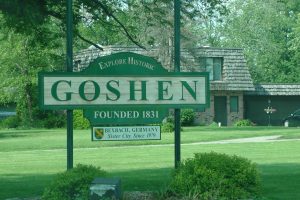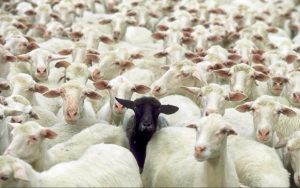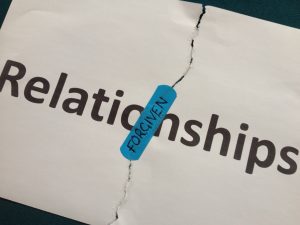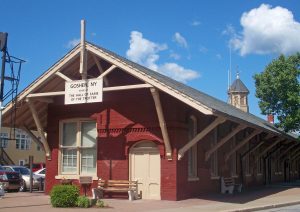Vayigash 2020: The City of Goshen
by devadmin | January 2, 2020 7:13 pm
We begin with mazel tov wishes to friends of many decades, Shaindy and Mark Mandelbaum of Los Angeles, CA upon the engagement of their daughter Jenny to Dov Ocken of Baltimore, MD. May Jenny and Dov merit to enjoy many decades of blissful marriage. Mazel tov to both extended families. A special mazel tov to Jenny’s Grandmother Viola Mandelbaum (may she have an instant and full refuah) who hosted the Oisvorfer many times, and always sent him off with a freshly baked potato kugil.
The City of Goshen
For years while passing Goshen, New York on the way up to the Catskill Mountains, I used to wonder whether or not that town or whatever it, is was named after Goshen, Egypt a city we will be reading about in this and next week’s parshas. And the answer? I never knew. I never knew until this past Wednesday when I Googled Goshen, New York and read that it was named after “The Land of Goshen.” What next? I Googled “The Land of Goshen and found this: all roads lead back to the heylige Toirah. Says the achroin (latter day exegete) Wikipedia, azoy: the Land of Goshen (Hebrew: אֶרֶץ גֹּשֶׁן ) is named in the Bible as the place in Egypt given to the Hebrews by the Pharaoh of Joseph (Book of Genesis, Genesis 45:9-10), and the land from which they later left Egypt at the time of the Exodus. It was located in the eastern Delta of the Nile, lower Egypt. Shoin!
 How many cities, towns and townships in the USA are named Goshen? Nu, if Jewish people once lived there, avada it’s a machloikes (dispute). According to one internet source, the number is 41. Another says “there are 32 places in the world named Goshen! There are 32 places called Goshen in the world.” Are these 32 included in the number 41 above? Ver veyst? Yet another source says “there are 5 cities named Goshen in the entire world.” Which is it? Ver veyst? The bottom line: there are Goshen’s all over the place. And we begin with Goshen why? Because the city of Goishen (or Goshen) is prominently featured and gets several shout-outs this week and next, let’s find out why.
How many cities, towns and townships in the USA are named Goshen? Nu, if Jewish people once lived there, avada it’s a machloikes (dispute). According to one internet source, the number is 41. Another says “there are 32 places in the world named Goshen! There are 32 places called Goshen in the world.” Are these 32 included in the number 41 above? Ver veyst? Yet another source says “there are 5 cities named Goshen in the entire world.” Which is it? Ver veyst? The bottom line: there are Goshen’s all over the place. And we begin with Goshen why? Because the city of Goishen (or Goshen) is prominently featured and gets several shout-outs this week and next, let’s find out why.
Welcome to parshas Vayigash which contains perhaps the most riveting scene in all of Bereishis, the words spoken by Yoisef to his brothers as he reveals his identity to them. Yearly as these words are read, and no matter how many times they have been heard, those without ice running through their veins, feel the moment and emotion all over again. It’s high drama as Yoisef accepts the past, tells the brothers that it was not them who sent him on his journey to power in Mitzrayim –via slavery, after being accused of rape and caught up in the #MeToo movement, separation from his father, his younger brother, his step-mom’s and even his less than pleasant bothers who planned to kill him. Atypical family dispute. Centuries before Shakespeare, the RBSO gave us some excellent theater in this parsha as it features not one reunion, but a second when Yoisef sees his father for the first time in over two decades. Hearts beat louder as the story unfolds. By chance it’s also the Oisvorfer’s bar mitzvah parsha and by definition, his birthday this past Wednesday. Shoin, let’s talk about Goishen.
Following the big reveal, Yoisef instructs the still somewhat shell-shocked bothers to go home, pack up their cattle and all other belongings, and return with their father and his entire extended family. And then he says this, “and you will live in the land of Goishen.” As you read the pisukim below you will notice that no other city in Mitzrayim was in consideration. Why Goishen? We don’t know. Why not? Because the heylige Toirah is silent on Yoisef’s reasoning and motives. And before we learn how others understood Yoisef’s motivation in selecting Goishen, let’s read how many more times Goishen is mentioned in this week’s parsha and next. Says the heylige Toirah (Bereishis 45:10), azoy.
10. And you shall dwell in the land of Goishen, and you shall be near to me, you and your children and your grandchildren, and your flocks and your cattle and all that is yours. |
יוְיָֽשַׁבְתָּ֣ בְאֶֽרֶץ־גּ֗שֶׁן וְהָיִ֤יתָ קָרוֹב֙ אֵלַ֔י אַתָּ֕ה וּבָנֶ֖יךָ וּבְנֵ֣י בָנֶ֑יךָ וְצֹֽאנְךָ֥ וּבְקָֽרְךָ֖ וְכָל־אֲשֶׁר־לָֽךְ: |
Let’s also read these pisukim.
| 28. He sent Yehudah ahead of him to Yoisef, to direct him to Goishen, and they came to the land of Goishen. | כחוְאֶת־יְהוּדָ֞ה שָׁלַ֤ח לְפָנָיו֙ אֶל־יוֹסֵ֔ף לְהוֹרֹ֥ת לְפָנָ֖יו גּ֑שְׁנָה וַיָּבֹ֖אוּ אַ֥רְצָה גּֽשֶׁן: | |
| 29. And Yoisef harnessed his chariot, and he went up to meet Israel his father, to Goishen, and he appeared to him, and he fell on his neck, and he wept on his neck for a long time. | כטוַיֶּאְסֹ֤ר יוֹסֵף֙ מֶרְכַּבְתּ֔וֹ וַיַּ֛עַל לִקְרַאת־יִשְׂרָאֵ֥ל אָבִ֖יו גּ֑שְׁנָה וַיֵּרָ֣א אֵלָ֗יו וַיִּפֹּל֙ עַל־צַוָּארָ֔יו וַיֵּ֥בְךְּ עַל־צַוָּארָ֖יו עֽוֹד: | |
And then 46:34, and lets also read 47:1-7 and close out with 47:27:
| 46:34. You shall say, ‘Your servants have been owners of livestock from our youth until now, both we and our ancestors,’ so that you may dwell in the land of Goishen, because all shepherds are abhorrent to the Egyptians.” | לדוַֽאֲמַרְתֶּ֗ם אַנְשֵׁ֨י מִקְנֶ֜ה הָי֤וּ עֲבָדֶ֨יךָ֙ מִנְּעוּרֵ֣ינוּ וְעַד־עַ֔תָּה גַּם־אֲנַ֖חְנוּ גַּם־אֲבֹתֵ֑ינוּ בַּֽעֲב֗וּר תֵּֽשְׁבוּ֙ בְּאֶ֣רֶץ גּ֔שֶׁן כִּי־תֽוֹעֲבַ֥ת מִצְרַ֖יִם כָּל־רֹ֥עֵה צֹֽאן: | ||
47:1. Yoisef came and told Paroy, and he said, “My father and my brothers and their flocks and their cattle and all that is theirs, have come from the land of Canaan, and behold, they are in the land of Goishen.” |
אוַיָּבֹ֣א יוֹסֵף֘ וַיַּגֵּ֣ד לְפַרְעֹה֒ וַיֹּ֗אמֶר אָבִ֨י וְאַחַ֜י וְצֹאנָ֤ם וּבְקָרָם֙ וְכָל־אֲשֶׁ֣ר לָהֶ֔ם בָּ֖אוּ מֵאֶ֣רֶץ כְּנָ֑עַן וְהִנָּ֖ם בְּאֶ֥רֶץ גּֽשֶׁן: | ||
| 2. And from among his brothers he took five men, and he presented them before Paroy. | בוּמִקְצֵ֣ה אֶחָ֔יו לָקַ֖ח חֲמִשָּׁ֣ה אֲנָשִׁ֑ים וַיַּצִּגֵ֖ם לִפְנֵ֥י פַרְעֹֽה: | ||
3. And Paroy said to his brothers, “What is your occupation?” And they said to Paroy, “Your servants are shepherds, both we and our forefathers.” |
גוַיֹּ֧אמֶר פַּרְעֹ֛ה אֶל־אֶחָ֖יו מַה־מַּֽעֲשֵׂיכֶ֑ם וַיֹּֽאמְר֣וּ אֶל־פַּרְעֹ֗ה רֹעֵ֥ה צֹאן֙ עֲבָדֶ֔יךָ גַּם־אֲנַ֖חְנוּ גַּם־אֲבוֹתֵֽינוּ: | ||
4. And they said to Paroy, “We have come to sojourn in the land, for your servants’ flocks have no pasture, for the famine is severe in the land of Canaan. Now, please let your servants dwell in the land of Goishen.” |
דוַיֹּֽאמְר֣וּ אֶל־פַּרְעֹ֗ה לָג֣וּר בָּאָ֘רֶץ֘ בָּ֒אנוּ֒ כִּי־אֵ֣ין מִרְעֶ֗ה לַצֹּאן֙ אֲשֶׁ֣ר לַֽעֲבָדֶ֔יךָ כִּֽי־כָבֵ֥ד הָֽרָעָ֖ב בְּאֶ֣רֶץ כְּנָ֑עַן וְעַתָּ֛ה יֵֽשְׁבוּ־נָ֥א עֲבָדֶ֖יךָ בְּאֶ֥רֶץ גּֽשֶׁן: | ||
5. And Paroy spoke to Yoisef, saying, “Your father and your brothers have come to you. |
הוַיֹּ֣אמֶר פַּרְעֹ֔ה אֶל־יוֹסֵ֖ף לֵאמֹ֑ר אָבִ֥יךָ וְאַחֶ֖יךָ בָּ֥אוּ אֵלֶֽיךָ: | ||
6. The land of Egypt is [open] before you; in the best of the land settle your father and your brothers. Let them dwell in the land of Goishen, and if you know that there are capable men among them, make them livestock officers over what is mine.” |
ואֶ֤רֶץ מִצְרַ֨יִם֙ לְפָנֶ֣יךָ הִ֔וא בְּמֵיטַ֣ב הָאָ֔רֶץ הוֹשֵׁ֥ב אֶת־אָבִ֖יךָ וְאֶת־אַחֶ֑יךָ יֵֽשְׁבוּ֙ בְּאֶ֣רֶץ גּ֔שֶׁן וְאִם־יָדַ֗עְתָּ וְיֶשׁ־בָּם֙ אַנְשֵׁי־חַ֔יִל וְשַׂמְתָּ֛ם שָׂרֵ֥י מִקְנֶ֖ה עַל־אֲשֶׁר־לִֽי: | ||
7. So Yoisef brought his father Yaakov and stood him before Paroy, and Yaakov greeted Paroy. |
זוַיָּבֵ֤א יוֹסֵף֙ אֶת־יַֽעֲקֹ֣ב אָבִ֔יו וַיַּֽעֲמִדֵ֖הוּ לִפְנֵ֣י פַרְעֹ֑ה וַיְבָ֥רֶךְ יַֽעֲקֹ֖ב אֶת־פַּרְעֹֽה: | ||
| 47:27. And Yisrael dwelt in the land of Egypt in the land of Goishen, and they acquired property in it, and they were prolific and multiplied greatly.
|
כזוַיֵּ֧שֶׁב יִשְׂרָאֵ֛ל בְּאֶ֥רֶץ מִצְרַ֖יִם בְּאֶ֣רֶץ גּ֑שֶׁן וַיֵּאָֽחֲז֣וּ בָ֔הּ וַיִּפְר֥וּ וַיִּרְבּ֖וּ מְאֹֽד: | ||
 And while the number of shout outs for Goishen doesn’t quite compare to the figures we quoted in the opening of the review, still it’s rather remarkable how often Goishen is mentioned. And we ask azoy: Vus iz eym gigangin in leybin (why did Yoisef care so much) that his family davka settle in Goishen? Was it an early version of the Five Towns? Was Goishen considered suburbia? What the hec was going on in Goishen and why taka are so many cities and other places all over the world named Goshen? Was Goishen the best place for them? Was it choice land? And while the Oisvorfer has no clue why Goishen took off in popularity all over the world, there are a good number of opinions from our sages and others as to its importance and why it was davka selected.
And while the number of shout outs for Goishen doesn’t quite compare to the figures we quoted in the opening of the review, still it’s rather remarkable how often Goishen is mentioned. And we ask azoy: Vus iz eym gigangin in leybin (why did Yoisef care so much) that his family davka settle in Goishen? Was it an early version of the Five Towns? Was Goishen considered suburbia? What the hec was going on in Goishen and why taka are so many cities and other places all over the world named Goshen? Was Goishen the best place for them? Was it choice land? And while the Oisvorfer has no clue why Goishen took off in popularity all over the world, there are a good number of opinions from our sages and others as to its importance and why it was davka selected.
And this year, instead of going over the details of the great reveal and the emotional aftermath, the reunion between dad and son, the meeting before Paroy, the so-called yeshiva Yehudah established over in Goishen, let’s try and chap what may have been on Yoisef’s mind when he instructed his father to relocate and settle in Goishen.
As mentioned just above, there are several explanations offered for why Yoisef specifically wanted his brothers and father to reside there, let’s read a few. Says Rashi, the Radak, and a few others (46:34), azoy: Goishen was well-suited for shepherding. It apparently offered more fertile and verdant pasture land than other regions in Mitzrayim, and Yoisef therefore made a point of having his father and brothers settle there. And by being more fertile we can assume that the cattle too were quite fertile, hence the Yaakov Ovenu family was able to thrive while living in Goishen. That sounds like rational thinking. And taka says The Bechor Shor: Goishen was generally a higher quality area and Yoisef wished for his family to reside there and enjoy the very best the country had to offer. So far so good.
Ober says the Ramban: “Yoisef knew that his father would not want to remain in the land of Egypt [proper] where the royal capital was situated, so already now he sent to him that he would have him reside in the land of Goishen.” Yoisef seemingly knew or thought that Yaakov was not an inner-city man, that he efsher preferred -as do many Yiddin- the outskirts, or the suburbs. The appeal of Goishen was its remoteness. Yoisef chapped that Yaakov would prefer to live in the outskirts distant from the country’s cultural and commercial centers, and therefore chose the land of Goishen for this purpose.
Says Rav Shamshon Refoel Hirsch: Yoisef was avada smart and chapped that the Mitrzrim had a great distaste for shepherds. And taka as we get to 46:34 we read just that.
| 46:34. You shall say, ‘Your servants have been owners of livestock from our youth until now, both we and our ancestors,’ so that you may dwell in the land of Goishen, because all shepherds are abhorrent to the Egyptians.” | לדוַֽאֲמַרְתֶּ֗ם אַנְשֵׁ֨י מִקְנֶ֜ה הָי֤וּ עֲבָדֶ֨יךָ֙ מִנְּעוּרֵ֣ינוּ וְעַד־עַ֔תָּה גַּם־אֲנַ֖חְנוּ גַּם־אֲבֹתֵ֑ינוּ בַּֽעֲב֗וּר תֵּֽשְׁבוּ֙ בְּאֶ֣רֶץ גּ֔שֶׁן כִּי־תֽוֹעֲבַ֥ת מִצְרַ֖יִם כָּל־רֹ֥עֵה צֹֽאן: |
Ober, so integral was shepherding to the identity of Yaakov’s children that when they were introduced to Paroy -the king of a nation which deified sheep and abhorred those who handled their god—they did not hide the fact that they supervised sheep for a living. To Paroy’s question (Bereishis 47:3), “What is your occupation?” they replied, “Your servants are shepherds, both we and our forefathers.” Ober to Yoisef, shepherding was his family’s greatest asset, as it would help ensure the preservation of their national identity and ethical lifestyle. Let’s recall that Moishe -future leader of the Yiddin was also a shepherd. So were a few other notable Toirah personalities including giants as Avrohom, Yitzchok, Yaakov, his beautiful daughter Rochel, and of course Dovid Hamelech (King David); they all herded goats and sheep. Seemingly, actually more than seemingly, the RBSO loves those who shepherd and many a famous shepherd was selected for greatness and fame. Says the medrish, what endeared Moishe to the RBSO as the prototypical Jewish leader was his tender way with animals. Going back a number of generations to the Odom and Chava family, the first human conflict recorded in the heylige Toirah –the shtikel misunderstanding which led Kayin to kill his brother Hevel, was rooted in Kayin being consumed with jealousy when the RBSO preferred and accepted the korban (gift offering) of the shepherd to that of the farmer. Shoin: why so many Yiddin choose to become doctors, lawyers and accountants, ver veyst. Did the RBSO ever select a doctor or lawyer for fame? Are any ever mentioned by name? Case closed! Though our man Yoisef was never a shepherd, he was – by his brothers- considered to be the black sheep in his family. Shoin!
 Sadly, the Mitzrim didn’t share the RBSO’s feeling for the profession and Yoisef needed to keep his shepherd brothers away from them. Accordingly, he had them move to Goishen where they could establish their own community with their own customs. Think of Monroe, New York not very far from Goshen. Yoisef thus chose Goishen not because of any intrinsic characteristic of that region, but due simply to its remoteness, which would allow the Yiddin to grow and develop independently as a separate nation.
Sadly, the Mitzrim didn’t share the RBSO’s feeling for the profession and Yoisef needed to keep his shepherd brothers away from them. Accordingly, he had them move to Goishen where they could establish their own community with their own customs. Think of Monroe, New York not very far from Goshen. Yoisef thus chose Goishen not because of any intrinsic characteristic of that region, but due simply to its remoteness, which would allow the Yiddin to grow and develop independently as a separate nation.
Ober says the medrish (Midrash Ha-gadol), azoy: Yoisef wanted his family to live in Goishen “so that they would not mix with the Mitzrim, the Egyptian goyim. Seemingly, Yoisef chapped that bad stuff happens when they share space. Yoisef also chapped that the Mitzrim were from the early breed of anti-Semites, an issue that has and continues to plague the Yiddin ad hayoim hazeh (until today), an especially today. Yoisef sought to lower the chances of the family’s assimilation and made sure they would live separately from the main population centers in Mitzrayim, thereby preserving their independent identity and lifestyle. Seemingly the RBSO had other plans, and when He does, nothing can get in the way. As fate would have it, the Yiddin wound up living with the Mitzrim for some 210 years and became –as we will read below- quite assimilated. Ober, was Goishen the right place for Yaakov and his family? Wasn’t Goishen as well as its inhabitants also known as morally corrupt? They were? And we know this how and from where?
Says the heylige Toirah (Vayikro 18:3), “Do not follow the practices of the land of Egypt, in which you lived.” Says Rashi referencing the Toiras Kohanim that the conduct in ancient Egypt was more depraved than the conduct of any other nation of the time, and, furthermore, that “the place where the Yiddin (Yaakov’s family) resided conducted themselves abominably more so than anyone else.” Oy vey and say it’s not so please. The people in the place Yoisef chose for his father and brothers were mamish so bad? On the other hand, why are we to think that the posik referring to bad behavior davka speak of Goishen specifically? Is Goishen mentioned? It is not. Where in Mitzrayim was all this depravity taking place? Say the Sifsay Chachomim (and others) azoy: what the Toiras Kohanim refers to was in fact the native population of Goishen. And if that’s taka emes, that the Goishenites were bad people, morally bankrupt and involved in many forms of depravity -including avada of a sexual nature, why place them there? And if all that is emes – avada if the medrish says so, it must be- why would Yoisef want his father and brothers to reside in this region, which was known for its particularly corrupt and debased culture? And why would Yaakov agree to reside there? Was it Yoisef’s plan to keep his brothers occupied with the Goishenite shiksa mydlich so that they would be too preoccupied and without time to again kidnap, and or kill him? We shall explore that possibility below.
Nu, as you can only imagine, others were also bothered by this very question of why Yoisef would send his family to live among very bad people. Says Rashi as understood by the Mizrachi, azoy: the most immoral part of Mitzrayim was Goishen, where the Yiddin had settled. Was it the most immoral area before Yaakov and his family were there? And, if so, why did Yoisef choose it? Did fertile pastureland, override moral concerns? Or did it become the most immoral area only later when the Yiddin were there, and, if so, how do we understand that?
Says the Ra’avad azoy: the people of Goishen -and the general Mitzri population- became especially corrupt as a result of their enslavement of the Yiddin. In other words: they weren’t quite as bad before the enslavement. Ober, once enslavement began and feeling empowered over the Yiddin, their behavior took a turn for the worse. They morally deteriorated, until they became the most corrupt nation in the world. As well, the people of Goishen degenerated to the lowest stratum among the Egyptian populace. And the Yiddin? They too succumbed and followed their enslavers. Let’s recall learning that by the time the Yiddin left Mitzrayim, they had sunk to the 49th (out of 50) level of tumah (impurity) whatever that means; seemingly they too were eager participants in the depravity and licentiousness. In fact, Rashi and the medrish will tell us that had they sunk one more level, they would not have been worthy of redemption. As it was, the malochim (Angles) were arguing with the RBSO that the Yiddin were not worthy as they too were serving avoido zoro. In this case, the words avoido zoro are all encompassing; they were chapping where they should not have. The bottom line: it appears that the bad behavior of the Goishenites (and the Yiddin) all started much later and not when Yoisef decided to move his family there. Shoin, once again Yoisef is exonerated.
The bottom line: it appears that Goishen only became the most immoral location after the Yiddin settled there, and that it became progressively worse during enslavement. Medrish tells us they sunk to their lowest depths during the last generation before the Exodus. Says the Sifra: it was the presence of the Yiddin that caused this moral descent; oy vey!
Earlier we asked whether or not Yoisef perhaps moved his brothers far away for more selfish reasons; was he worried about them? And taka, says the Chizkuni, azoy: Yoisef was concerned that if they [his holy brothers] would live near him, they –with their smarts and cunning- could become noblemen in Paroy’s palace. And were that to happen, they would demote him from his high stature, for on account of their jealousy over a striped tunic they sold him. In other words: Yoisef wasn’t quite sure that the brothers ever repented, he did not trust them. In fact, nowhere does the heylige Toirah tell us that they did. In more other words: as the Chizkuni sees what went down, Yoisef wanted his brothers to live in isolation in order to prevent them from assuming positions of power in the Egyptian government. It seems that Yoisef sensed his brothers’ talents and ability to assert authority. He feared that they would rise through the Egyptian political hierarchy, and at some point, the flames of fraternal jealousy would be reignited. They would, once again, conspire against him. So says the Chizkuni about our heylige shvotim (holy tribes)? He does! Seemingly, Yoisef was still smarting from his 22 plus year ordeal and who can blame him?
 And the bottom line? After a long dispute, 22 plus years in this case, Yoisef was mindful of managing expectations even after reconciliation. Lesson learned for all of us. Seemingly, things do not –at least not for a while, if ever, go back to normal. Though Yoisef reconciled and said all the right things to his brothers, as Chizkuni sees it –and based on his insights -he chapped the human condition- even after reconciliation, even a joyous one, there was lingering or even permanent damage to the relationship. A fairy tale ending was not the result. Restoring broken relationships –if at all possible- takes effort, at times of a herculean nature. We’ve all been there and done that.
And the bottom line? After a long dispute, 22 plus years in this case, Yoisef was mindful of managing expectations even after reconciliation. Lesson learned for all of us. Seemingly, things do not –at least not for a while, if ever, go back to normal. Though Yoisef reconciled and said all the right things to his brothers, as Chizkuni sees it –and based on his insights -he chapped the human condition- even after reconciliation, even a joyous one, there was lingering or even permanent damage to the relationship. A fairy tale ending was not the result. Restoring broken relationships –if at all possible- takes effort, at times of a herculean nature. We’ve all been there and done that.
A gittin Shabbis-
The Heylige Oisvorfer Ruv
Yitz Grossman
Source URL: https://oisvorfer.com/vayigash-2020-the-city-of-goshen/
